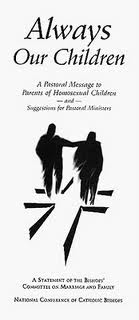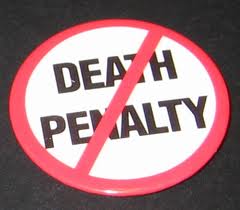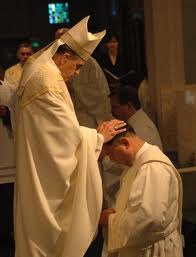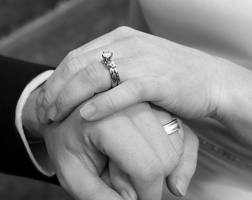For the communities of Dignity/NoVA at Emmanuel Church-on-the-Hill in Arlington, VA and Dignity/Washington at St. Margaret’s Episcopal Church, Washington, DC.
Readings:
1 Is 66:10-14c; Ps 66:1-3, 4-5, 6-7, 16, 20; Gal 6:14-18; Lk 10:1-12, 17-20
Before I get to the heart of what I want to say, let me make one comment about the reference Jesus makes at the end of this passage from Luke – a comment that perhaps might be of help if ever you find yourself in a “discussion” – and hopefully it will be a “discussion” and not an “argument” – with someone who is claiming that “the Bible itself condemns gay people.” As many of us know, there are just a small handful of passages from the Bible that many people have used to condemn God’s gay and lesbian children – passages that we generally consider to be incorrectly taken out of their historical and cultural context, and thus misunderstood and misinterpreted – and one of them has to do with Sodom. This perhaps is the most well-known, the most notorious, because the word “Sodom” (which comes from the Hebrew word for “burnt”) found its way into English with the ill-defined words of “sodomy” and “sodomite.” You recall the story from the Book of Genesis in which two divine messengers come to the town of Sodom and are greeted by Lot. As was so important a custom in that part of the world, Lot extended a welcome to these strangers, offering them that life-giving hospitality without which travelers in the harsh terrain could perish. Hospitality also placed a responsibility on the shoulders of the one who extended it; and that responsibility was to protect those to whom shelter and welcome were given. Now, for unstated reasons, the citizens of Sodom come to Lot’s house and demand that he bring out these strangers so that they might abuse, probably rape them. And so the debate has been – is this passage about homosexuality, or is the true sin of the people of Sodom the fact that they turned their backs on the custom of hospitality and the responsibilities that come with welcoming the stranger?
So if you do find yourself in that discussion, you can and should point to this passage from Luke. Because here, in the words of Jesus, we have a reference to Sodom, that city which God destroyed. In making this reference, is Jesus speaking about sexual behavior? Clearly not. Jesus is making a reference, an allusion that was probably well-understood by his hearers, simply by naming the town. That reference, that allusion, is in the context of the lack of welcome, the lack of hospitality that his disciples might receive as they go about their mission of preaching in those towns and villages that Jesus intends to visit. And so, Luke chapter 9 supports the claim that the real sin of Sodom had nothing to do with sexual behavior, but was their lack of hospitality and caring for those in need.
So … moving on… we have this weekend a collection of readings that don’t necessarily have a common thread or theme that jumps out at us. In fact, these three passages have a wealth of ideas that we can reflect on, but the one thing I would like to draw our attention to is what Jesus instructs these 72 disciples – going out in pairs – to do when they enter a village or a town. He tells them that they are to:
- head directly to their destination without being side-tracked along the way;
- accept hospitality in whatever way it is given;
- cure the sick and tell them that God’s Reign is at hand
- but … their very first words are an offering of Peace. “Into whatever house you enter, first say, ‘Peace to this household.’ If a peaceful person lives there, your peace will rest on him; but if not, it will return to you.”
Much of Luke’s Gospel is focused on Jesus’ “going up to Jerusalem,” and this story from the 9th chapter of Luke is set n that context. In the previous chapter – chapter 8 – Luke tells us that the time had come for Jesus to be taken up, to be “lifted up,” Jesus decides it’s time for him to go up to Jerusalem, the place where Jesus knows he will suffer and die, where he will be lifted up on the cross. And so, it’s in this context that we have this story of Jesus sending out the 72 … the context of going up to Jerusalem — in Hebrew, Yerushaláyim – the city whose very name means, “the abode of Peace,” or the “the dwelling place of peace.”
Earlier this week I was listening to bits and pieces of the testimony before the Senate about the nomination of Elena Kagan to the Supreme Court. After her own testimony and questioning, the Senate Committee listened to various panelists presenting their views, people who both support her nomination and who those who oppose it. As I listened to the testimony of one particular person – someone who heads an organization with roots in conservative Christianity and whose stated mission is “Defending Family, Faith and Freedom,” – he was making the argument that he believes the nominee is anti-military and opposed to veterans and military service. In saying this, he said something that I found very striking. “War is the most difficult human activity, bar none.” When I heard that, I was puzzled, and I thought – Really? Is that really true? Is war the most difficult of all human activity? Now, I don’t mean to dismiss or overlook the countless sacrifices made and burdens borne by the hundreds of thousands of men and women – and their families – men and women in years past and even in our present day who have stepped forward to – as the saying goes – “stand in harm’s way” so that we might enjoy the blessings, the liberties and freedoms that we celebrate as a nation this weekend. War is, no doubt a very difficult and even a terrible thing. But when we look at the whole span of human history, we humans have been pretty good at fighting war. And so when I heard that statement – “War is the most difficult human activity, bar none,” … my immediate reaction was to ask, “What about peace?” It struck me that if we look at this from the perspective in which “success” or “failure” is a measure of difficulty, isn’t Peace a more difficult human activity? Isn’t it more difficult to follow the command of Jesus to be bearers of peace, to be sources of peace, to be instruments of peace?
Many of us will remember a time when the collective voice of the Bishops in our country had a weight that, for various reasons, seemed stronger than it does today. It was 27 years ago, in 1983, that the Bishops issued a Pastoral Letter on War and Peace entitled, The Challenge of Peace: God’s Promise and Our Response. And while this pastoral letter reflected the time in our nation’s history in which it was written – a time in which its focus was not so much on the type of wars being fought today, but rather focused on the possibility of nuclear war and issues surrounding nuclear deterrence – the guiding principles articulated in that letter are still worth remembering. If you’ve never read this document, I encourage you to do so. It’s not light summer beach reading, but rather is a thoughtful and in-depth discussion of war, of peace, and what we as Christians can and must do to further advance that Reign of God which, while still close at hand, sometimes seems so very far away.
Let me close by reading one brief passage in which the Bishops remind us of some core values and perspectives: “At the center of the Church’s teaching on peace and at the center of all Catholic social teaching are the transcendence of God and the dignity of the human person. The human person is the clearest reflection of God’s presence in the world; all of the Church’s work in pursuit of both justice and peace is designed to protect and promote the dignity of every person. For each person not only reflects God, but is the expression of God’s creative work and the meaning of Christ’s redemptive ministry..” [emphases added].
“The transcendence of God and the dignity of every human person.” As we observe the 234th anniversary of that day in which our forebears declared to the world that “All people are created equal,” let us pray that we will never forget that “All” means “All” and that as followers of Jesus who suffered, died and conquered death so that we might have peace and the fullness of life, that we also have what it takes to engage every day in that most difficult of human activities, bar none … the activity of being instruments of God’s peace every moment of our lives.









